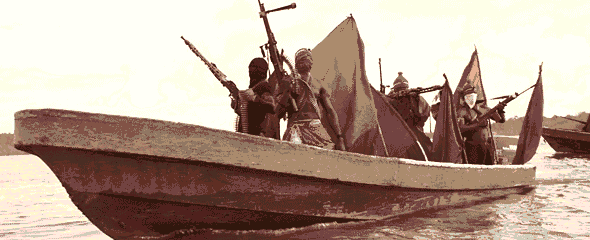The recent violent attack on the Malta-flagged VLCC MT Kalamos off the Nigerian coast has sparked a fresh round of talks in the shipping industry about the escalating piracy threat in West Africa and its potential implications.
Shipping and maritime security sources say an inadequate response to piracy is likely to result in higher insurance premiums and crewing costs for shipowners and encourage them to lobby for stricter security measures.
“It’s a very sad incident and it will have an impact on how business is done in WAF,” a shipowner said. “The pirates down there are ruthless and can cause grave damage to the ship and crew. Owners are going to have to start taking precautions such as employing security teams to deal with the threat.”
The problem is that the use of armed guards, a method consistently promoted by shipping players and used effectively to battle Somali piracy, would not be easy to implement in the West African region.
“Most of the piracy attacks in West Africa take place in the coastal waters of African countries,” said Chris Trelawny, senior deputy director of the Maritime Safety Division at the International Maritime Organization (IMO).
 “And certainly, those states would not be easily convinced to let armed private contractors into their territory.”
“And certainly, those states would not be easily convinced to let armed private contractors into their territory.”
There are also other legal and insurance risks involved in using armed guards, industry sources say. These include the reliability of guards available in the region and responsibility for injury or death of pirates, armed mercenaries or the crew on the vessel attacked.
The African state in whose territorial waters the incident takes place may hold the shipowner involved responsible, unlike in the case of Somali piracy attacks, which affect vessels transiting international waters, sources said.
PERSISTENT THREAT
According to Cyrus Mody, assistant director of the International Maritime Bureau, the piracy threat in the Gulf of Guinea is a very serious and often underrated issue, which might escalate further unless there is a major overhaul to security efforts.
“The pirate attacks there are usually well executed, deadly and routed in organized criminal groups,” Mody said. “Pirates not only take valuables and hostages from the vessels, they also in some cases attempt to steal the cargo, demonstrating good technical expertise.”
Technical expertise is required to conduct a ship-to-ship transfer from a hijacked tanker to another pirate-controlled cargo ship, which is the prevalent piracy method for stealing cargoes around West Africa.
Pirates in most cases choose targets among the clean tankers, which carry refined petroleum products, As sources explained. Such products can then be easily sold on the Nigerian black market. Crude oil is not particularly valuable for pirates as it would require processing through low-capacity illegal refineries before becoming sales-worthy.
Since it is a lucrative business for criminals, piracy in the Gulf of Guinea will not be easily tackled.
“The scale of response to this threat is nowhere near to what it should be,” Mody said. “A global response and pooling of resources is required, mostly to support local governments in their anti-piracy efforts.” He added that coordination of local coastguard forces and set-up of guarded anchorages in the area would be a good start.
Another factor that makes the piracy issue worse is the lack of reporting of piracy incidents from shipowners.
“Some choose not to report attacks as they fear retaliation from pirates, an rise in insurance costs and their vessels being held for investigation by authorities,” he said. “Such attitudes would also have to change if we are to battle piracy effectively.”
LONG-TERM IMPACT
As the piracy problem in West Africa is not of the kind to be resolved quickly, some shipping and oil trading players are raising concerns over its long-term implications.
The West African region is an extremely significant exporter of crude oil, with Nigeria, Angola, Equatorial Guinea and Gabon the key producers. “If piracy escalates, this could have an impact but we are still assessing it,” a West African crude trader said. “The recent attack on the VLCC might be an isolated incident, but the fear could still spread.”
India and particularly Indian refiners like BPCL and IOC are consistent and major buyers of WAF crude, and traders were waiting to see if demand from India might be affected by this incident.
However, most trading sources expect piracy to have little effect on the oil trade, considering the sheer size and importance of the region in terms of oil exports.
“Maybe shipowners will see some premium added but no impact expected on grade differentials,” a second WAF crude trader said.
The impact on shipping could be more significant. Sources said higher freight rates for certain WAF loadings were a possibility given the possible increase in expenses that could soon be faced by shipowners calling at countries such as Nigeria.
“This is a very serious situation, it’s the first killing we’ve seen in quite some time so people are nervous. The crew on a ship going to Nigeria is going to want to be paid more because of the danger involved and as a result I think the owners will be asking for higher freight rates,” a shipowner said.
According to sources with P&I clubs, higher war-risk premiums for going to West African ports are not on the table yet.
“We do keep a close eye on the situation though,” an underwriter said. “If we perceive that the risk to vessels has increased in the area, the premiums are likely to follow.”















